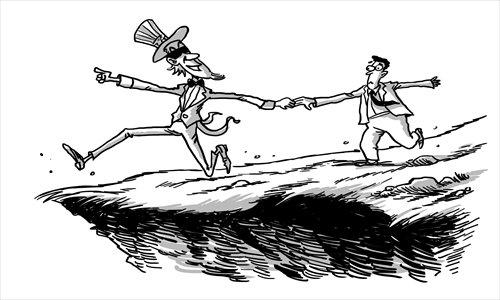SE Asia unnerved by US dollar trembles

In the US pivot to the Asia-Pacific region, the US economy and Asian market's trust in the dollar is the soft spot.
Almost all the Southeast Asian media has welcomed President Barack Obama's planned visit starting from November 17 and speculated about its significance, while media in the Philippines complained about the exclusion of the country from the tour.
A commentary in the Philippine Daily Inquirer on Monday stated that Obama's itinerary "excluded the Philippines, a longtime strategic security ally of the US in the Asia-Pacific region," which "ruffled sensitive nationalist feelings in Manila."
However, the stock market in Southeast Asia is not that fervent. The coming of Obama didn't bring any positive results. Recently, the Southeast Asian stock market has seen a drop. The main reason is the gloomy prospect of the US economy, which disturbs investors.
The stock market is an economic barometer. In the globalized world, it is also a thermometer of international relations. The complex feelings of Southeast Asian countries toward the US are reflected by the stock market.
The US economy is the driving force that Southeast Asia must rely upon. The US is not only the main export market of Southeast Asia, but also where the region will draw future investment from. The value of the dollar, the main currency in international trade, is bound to affect the nerves of the region.
Southeast Asian countries hope to deepen relations with the US in political, military and economic affairs. They hope the US can get more involved in regional issues, and they want to benefit from the US economy as well.
This is partly because they want to balance China's rising influence. Meanwhile, some of the countries have a close historical relationship with the US. Gradually, these countries are coming to rely on China economically and on the US for security.
Under such situation, the US has brought an increasing number of troubles to Southeast Asian countries. Every piece of news about the gloomy economy makes Southeast Asian companies nervous about looking of order forms. Each round of quantitative easing from Washington will enhance the distrust of the market toward the dollar.
Chodechai Suwanaporn, executive vice president of economics and energy policy at the Petroleum Authority of Thailand, wrote last week in an article for the Bangkok-based The Nation that there's "one-to-one correlation" between Thailand's economic growth and global economic growth. If the US "fiscal cliff" does happen, it "may hit Thailand by reducing 0.5-1.0 percentage points" from the country's baseline growth in 2013.
Of course, people don't believe that Washington will drop off the "fiscal cliff." It will find a solution at the last moment. However, the partisan rivalry in Washington makes people more worried about the US economy.
Even if Washington can find a way out of the financial crisis, it doesn't necessarily mean that it can remove the cause of its problem. The huge amount of debt will still dim the economic recovery. Will the US, in order to boost its economy, carry out several rounds of quantitative easing policies and shift the crisis by depreciating the dollar?
After Obama finishes his trip, everything will remain normal. Merchants in Cambodia and Bangladesh will continue to watch the float of the dollar with fear. Exporters in Thailand, Singapore and Malaysia will be worried about whether their orders are shrinking in value. And whether another round of inflation will be caused by more quantitative easing from the US will still give governments in Southeast Asia a headache.
The author is a senior editor with the People's Daily. He's now stationed in Bangkok. dinggang@globaltimes.com.cn